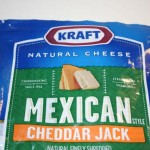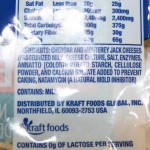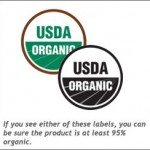Food and beauty product labeling has been a hot topic lately – or maybe that is just the case to me. I want to know what I am putting in an on my body and Stella’s – especially Stella’s! I feel that we have a right to know what the ingredients are, that includes knowing if it is a GMO product (genetically modified), what the natural flavorings are and what the meaning of natural really means for a specific product. I also believe that we should be able to choose what we grow, how we grow it, what we put in our body and that we should be able to choose whether or not we want pasteurized or radiated foods – why does the government and big business get to make those choices for us?!
I try to purchase only organic foods and beauty products and in regards to food – I try to only purchase process foods that have 5 ingredients or less – not an easy task. I am not saying that I always follow this, because I don’t – I get the craving for crap every once in awhile and I must confess that I allow that crap to enter my body – I am worse than Stella. I grew up with sugar cereals, hostess products, sugar on my fruit – but these are not in our house or part of Stella’s diet. When candy does come in to our house (Halloween, Christmas, Easter) I am the one that eats it not Stella!
 But let me get back to Natural vs. Organic. When I look natural up in the dictionary it reads – present in or produced by nature; not altered, treated or disguised. If I look a little further down it has natural food, definition: food that contains no additives, as preservatives or artificial coloring or flavoring. Now according to the USDA, foods can only be labeled natural if it contains no artificial ingredients or added colors and is minimally processed.
But let me get back to Natural vs. Organic. When I look natural up in the dictionary it reads – present in or produced by nature; not altered, treated or disguised. If I look a little further down it has natural food, definition: food that contains no additives, as preservatives or artificial coloring or flavoring. Now according to the USDA, foods can only be labeled natural if it contains no artificial ingredients or added colors and is minimally processed.  Sounds good, right – but there is more… Animal products raised with the use of artificial hormones can be labeled natural – yes I did type that correctly. And even better yet, genetically modified organisms (GMO’s) can be labeled natural. Are you confused yet? Of course you are and that is what marketers want you to be. There is no legal definition or standard for the use of natural on food or beauty products – so marketers can use it to their advantage – knowing that as a consumer you believe the definition of natural and therefore believe what is on the label. If you look at the cheese picture, it states it is natural, then look at the ingredients (sorry about the glare). Annato is a natural coloring, but remember what the definition of natural is and the other thing – the milk most likely comes form cows that have been injected with BGH ( thank you Monsanto) – a hormone to make the cows produce more milk. But as consumers, we are getting smarter – you may have read about this or watch it on the news, but check this out http://www.usatoday.com/money/industries/food/story/2012-04-29/kashi-natural-claims/54616576/1
Sounds good, right – but there is more… Animal products raised with the use of artificial hormones can be labeled natural – yes I did type that correctly. And even better yet, genetically modified organisms (GMO’s) can be labeled natural. Are you confused yet? Of course you are and that is what marketers want you to be. There is no legal definition or standard for the use of natural on food or beauty products – so marketers can use it to their advantage – knowing that as a consumer you believe the definition of natural and therefore believe what is on the label. If you look at the cheese picture, it states it is natural, then look at the ingredients (sorry about the glare). Annato is a natural coloring, but remember what the definition of natural is and the other thing – the milk most likely comes form cows that have been injected with BGH ( thank you Monsanto) – a hormone to make the cows produce more milk. But as consumers, we are getting smarter – you may have read about this or watch it on the news, but check this out http://www.usatoday.com/money/industries/food/story/2012-04-29/kashi-natural-claims/54616576/1
Now to look at Organic labeling. The USDA National Organic Program (NOP) defines organic as follows: Organic food is produced by farmers who emphasize the use of renewable resources and the conservation of soil and water to enhance environmental  quality for future generations. Organic meat, poultry, eggs, and dairy products come from animals that are given no antibiotics or growth hormones. Organic food is produced without using most conventional pesticides; fertilizers made with synthetic ingredients or sewage sludge; bioengineering; or ionizing radiation. Before a product can be labeled “organic,” a Government-approved certifier inspects the farm where the food is grown to make sure the farmer is following all the rules necessary to meet USDA organic standards. Companies that handle or process organic food before it gets to your local supermarket or restaurant must be certified, too. So what does this really mean? If you see the organic label – the produce and ingredients were grown without the use of pesticides, synthetic fertilizers, sewage sludge, genetically modified organisms (GMOs) or ionizing radiation. In regards to animals products – that animals do not take antibiotics or growth hormones.
quality for future generations. Organic meat, poultry, eggs, and dairy products come from animals that are given no antibiotics or growth hormones. Organic food is produced without using most conventional pesticides; fertilizers made with synthetic ingredients or sewage sludge; bioengineering; or ionizing radiation. Before a product can be labeled “organic,” a Government-approved certifier inspects the farm where the food is grown to make sure the farmer is following all the rules necessary to meet USDA organic standards. Companies that handle or process organic food before it gets to your local supermarket or restaurant must be certified, too. So what does this really mean? If you see the organic label – the produce and ingredients were grown without the use of pesticides, synthetic fertilizers, sewage sludge, genetically modified organisms (GMOs) or ionizing radiation. In regards to animals products – that animals do not take antibiotics or growth hormones.
Organic labeling is a 3 part systems: 100% organic – products made entirely from certified organic ingredients; organic – products made with at least 95% organic ingredients; and then made with organic ingredients – the product contains a minimum of 70% organic ingredients.
I think the choice is simple – organic. Why would you want to put pesticides, chemicals, synthetic products, artificial products and items that you can’t even pronounce into your body? If that is not reason enough, here are a couple more.
– Girls are hitting puberty earlier because of the hormones on the meat and dairy products;
– An independent review of the evidence found that organic crops had significantly higher levels of all 21 nutrients analyzed compared with conventional produce including vitamin C (27% more), magnesium (29% more), iron (21% more) and phosphorous (14% more);
– The most dangerous chemicals used in farming such as organophosphates [pesticides] have been linked with a range of conditions such as cancer, decreasing male fertility, fetal abnormalities, chronic fatigue syndrome in children and Parkinson’s disease;
– Pesticide residues have been ranked among the top three environmental cancer risks by the American Government;
– The potential health risk of GMOs are unknown, and
– Organic farming is better for the environment since it does not use toxic chemicals that will run off to pollute soil and water.
Ultimately the decision is yours, but I hope that you become an educated consumer. The cost of organic foods are more than chemical laden foods, but you only have one body – shouldn’t you put the best things in it?!
 Copyright secured by Digiprove © 2012
Copyright secured by Digiprove © 2012 
 Follow
Follow






You did a wonderful job here. And, the more folks who begin to understand these issues the better. Thanks for all your good efforts!! Makes me smile.
Thank you and your welcome! 🙂
Informative article Pamela. I like the saying “if you don’t take care of your body, where will you live.”
That is a great saying!
Pamela – A great article of facts folks should know. I’m forwarding it to Larry’s daughter who has a little boy.
Thanks for the foot work.
Virginia
Thanks for passing it on – glad my footwork could help.